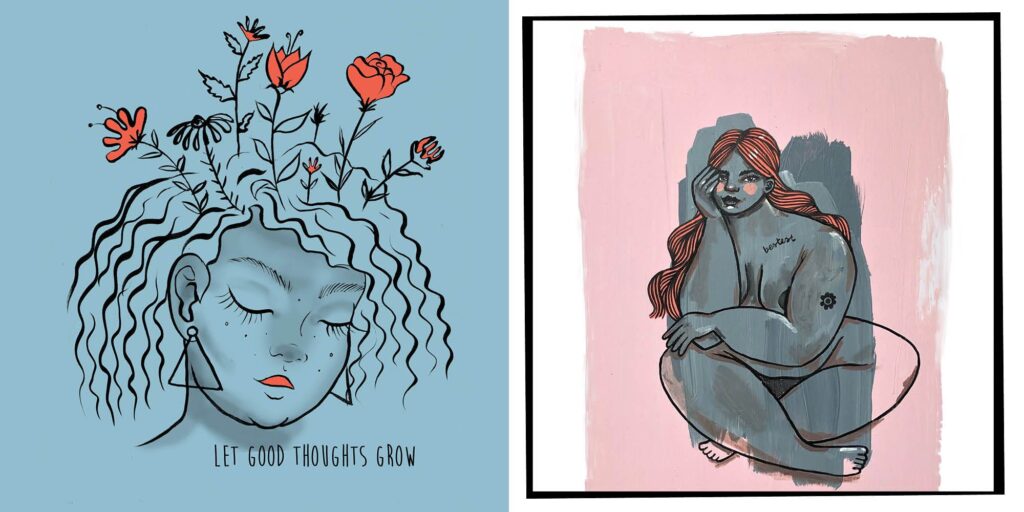
ELLE Magazine’s article titled “We Asked Five Illustrators to Draw What Body Image Means To Them and The Results Were Everything” by Amy Brewster, published on May 13th, 2019 for mental health awareness week is a captivating exploration of body image from the perspectives of diverse illustrators. The article features a collection of artwork created by five illustrators, each offering their unique interpretation of body image. Through their illustrations, the artists express various themes, such as body positive, self-acceptance, beauty in diversity, and the impact of societal norms on body perception. The artwork highlights the complex challenges surrounding body image, and how it is shaped by personal experiences, cultural influences, and media representation. ELLE Magazine’s article not only celebrates the artists’ creative expression but also serves a a platform to inspire its readers to reflect on their own perceptions of body image and embrace a more inclusive and empowering perspective.
Brewster provided a powerful reflection on the topics within Advertising and Body Image, as well as the context of globalization. The illustrations showcased in the article offered a diverse portrayal of perspectives on body image, challenging conventional beauty standards perpetuated by advertising in a globalized world. Through these illustrations, the artists showed the impact of advertising on shaping societal norms and influencing individuals’ perceptions of their bodies. The globalization of advertising has led to a stereotype and high-standard of beauty ideals, often promoting unrealistic and unattainable body standards. However, the featured artwork also celebrates body diversity and challenges the topics of the harmful effects that advertising practices have on our society. This ELLE magazine article critiques the negative influence of global advertising and advocates for a positive, authentic portrayal of bodies in the media. The article tells its readers to think about how advertising within our society and social media influence our own body image perceptions and helps us promote and spread a more body-positive and accepting global culture awareness.
———————————————————————————————

The ELLE magazine article titled “How Those Beach Body Ads Got it Wrong” explores the controversy surrounding a specific advertisement that sparked outrage on the internet. The article is co-authored by Miette L. Johnson and Sophie Beresiner, who analyze the ad and its impact on body image perceptions and societal standards of beauty. Titled #eachbodysready, the ad campaign intended to promote a beach-ready body, but its release raised concerns in certain platforms about promoting unhealthy beauty standards and body shaming. The article begins by explaining the prevalent issue of body image in contemporary society, emphasizing the pressure individuals face to conform to unrealistic beauty ideals created by media and advertising. The authors dive into the specifics of the ad, dissecting its visual content, slogans, and messaging, which they argue perpetuate harmful stereotypes and unrealistic standards. The authors call attention to the importance of promoting body positivity and inclusivity in advertising. They emphasize the need for brands and media outlets to responsibly represent diversity in body shapes, sizes, and ethnicities, moving away from the traditionally narrow beauty standards that have long dominated the industry. Furthermore, the authors discuss the role of social media in emphasizing public reactions to specific ads, highlighting how the campaign’s hashtag #eachbodysready sparked a significant backlash. They examine the power of collective activism and body-positivity movements on social media platforms in extremely challenging harmful advertising and push for more inclusive representation. Throughout the article, the authors advocate for a shift in advertising strategies to empower individuals to embrace their bodies and build a positive self-image. They encourage brands to adopt ethical advertising strategies that prioritize authenticity, inclusivity, and empowerment, acknowledging that consumers respond more favorably to campaigns that celebrate diversity. Overall, the article addresses the crucial issue of body image and beauty standards perpetuated by the advertising industry, encouraging its readers to engage with advertisements and media, recognizing the potential impact on shaping societal norms and personal perceptions of self-worth.
The article directly relates to Advertising and Globalization’s body image theme in the context of globalization. In Advertising and Globalization’s lecture on body image, as a class we have explored how advertising plays a pivotal role in shaping societal perceptions of beauty and body ideals, often reinforcing harmful stereotypes and promoting unrealistic body standards. This ELLE magazine article serves as a great example of how the advertising industry’s messages can have far-reaching consequences in a globalized world, where media and social media platforms transcend borders and impact diverse cultures. The ad campaign’s use of the hashtag #eachbodysready and its continuous internet backlash demonstrate the power of social media in connecting individuals worldwide to challenge harmful advertising practices. Additionally, the article underscores the importance of considering cultural nuances and local sensitivities in advertising, especially as globalization increasingly exposes diverse populations to Western beauty norms. By analyzing this specific campaign’s shortcomings and advocating for inclusive representation, the article echoes the lecture’s emphasis on promoting responsible and ethical advertising practices that empower individuals all across society to foster a positive body image around global audiences.